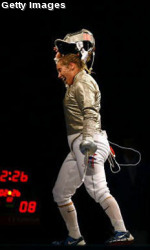Aug. 9, 2008
Photo Gallery
BEIJING, China (AP) – A trio of American flags were raised to the rafters at the Olympic Fencing Hall as tears streamed down the face of former Notre Dame All-American and 2006 NCAA champion Mariel Zagunis, winner of the first U.S. gold medal of the Beijing Olympics.
“It was a dream come true,” said Zagunis, who led an American sweep of Saturday’s women’s saber fencing.
Zagunis secured the gold with a 15-8 victory over Sada Jacobson, who won the silver. Becca Ward took the bronze.
Zagunis was also saber champion in 2004, when she became the first American in a century to win a fencing gold. Now, the U.S. is a legitimate powerhouse – in women’s saber at least. These same three women are seeded No. 1 for the team competition on Thursday.
“We hope that any success we have goes to making our sport more popular,” Jacobson said. “If we can get even one girl to take up fencing, then we’ve done well.”
With her twin gold medals, Zagunis not only becomes the first U.S. fencer ever to win multiple sabre golds, but also the first of any nationality since France’s Jean-Francois Lamour won golds in men’s sabre in 1984 and 1988 (the women’s sabre event was added in 2004).
In addition, Zagunis is the first former Notre Dame student-athlete ever to earn multiple Olympic gold medals, with five other individuals collecting golds once with Team USA — Vince Boryla (basketball 1948), Adrian Dantley (basketball 1976), Ruth Riley (basketball 2004), Shannon Boxx (soccer 2004) and Kate Sobrero Markgraf (soccer 2004).
In fact, former Notre Dame track & field All-American (and future coach) Alex Wilson is the only other Fighting Irish athlete to have earned multiple Olympic medals of any kind — competing for his native Canada, Wilson won a bronze in the 1,600-meter relay at the 1928 Amsterdam Games, then took a silver in the 800 meters and a bronze in the 400 meters at the 1932 Los Angeles Olympics. Zagunis could match Wilson’s Notre Dame Olympic medal haul if she can help the U.S. women’s sabre team to the medal podium next week.
Zagunis enrolled at Notre Dame in the fall of 2004 and helped lead the Irish to the `05 NCAA title. She competed with the Fighting Irish for two seasons and compiled an impressive resume that included the ’06 NCAA sabre crown and the ’05 national runner-up spot. Zagunis registered a 75-3 regular-season record with the Irish.
Before the fencing medals were awarded, the Americans had been shut out of Olympic medals, trailing the likes of Cuba, North Korea, Taiwan and Uzbekistan in the overall standings. Then the saber trio went to work, moving the U.S. to the top of the table with three medals.
And to make the night even more memorable, former President George H.W. Bush was in the front row for the medal ceremony, just to the side of where the three flags were lifted.
“It was amazing. It was emotional. It was such a dramatic moment,” Bush said. “To win all three was simply magnificent.”
The sport endured some growing pains even after Zagunis’ big win in 2004. The U.S. Olympic Committee took over USA Fencing’s high performance program for this year’s Olympics, citing financial problems for the sport’s national governing body.
“We’re just here trying to do our jobs,” Jacobson said. “It hasn’t been an issue that has impeded our performance at all.”
Clearly not.

Zagunis celebrates after scoring the final point in her 15-8 Olympic gold-medal sabre win over Sada Jacobson on Saturday in Beijing, China.
|
Zagunis and Ward, members of the same Oregon fencing club, met in the semifinals. Zagunis prevailed 15-11, and Ward left in tears.
Ward still looked red-faced and shaken when she came out for the bronze medal match, and she fell behind 6-1 to Russia’s Sofiya Velikaya. But the 18-year-old from Portland, Ore., rallied for a dramatic 15-14 victory that ensured a U.S. sweep.
“I kind of got my head back in the bout that I was in, because I was really hung up on my last bout,” Ward said. “It was a quick turnaround.”
Once that victory was out of the way, Zagunis and Jacobson took center stage. Jacobson, of Dunwoody, Ga., won the bronze in 2004. She was the top seed in this year’s competition but couldn’t overcome Zagunis in the final.
Zagunis, of Beaverton, Ore., led throughout the gold medal bout – her most lopsided win of the tournament. When it was over, Zagunis ripped off her mask and let out a yell, then shook hands with Jacobson and shared a hug with her teammate. Zagunis returned to the strip with an American flag, which she held in her hands while bowing in two directions.
She then dropped down and kissed the floor.
Jacobson missed out on a similar celebration – but the joy eventually hit her.
“I don’t think I anticipated the emotion I would feel up there,” Jacobson said of sharing the podium. “It was such a feeling of pride.”
At least one famous American felt it too.
“Fencing may not be a big sport in America,” Bush said. “But today at the Olympics, it certainly is.”
NOTE: The Notre Dame Sports Information Office contributed to this story.







